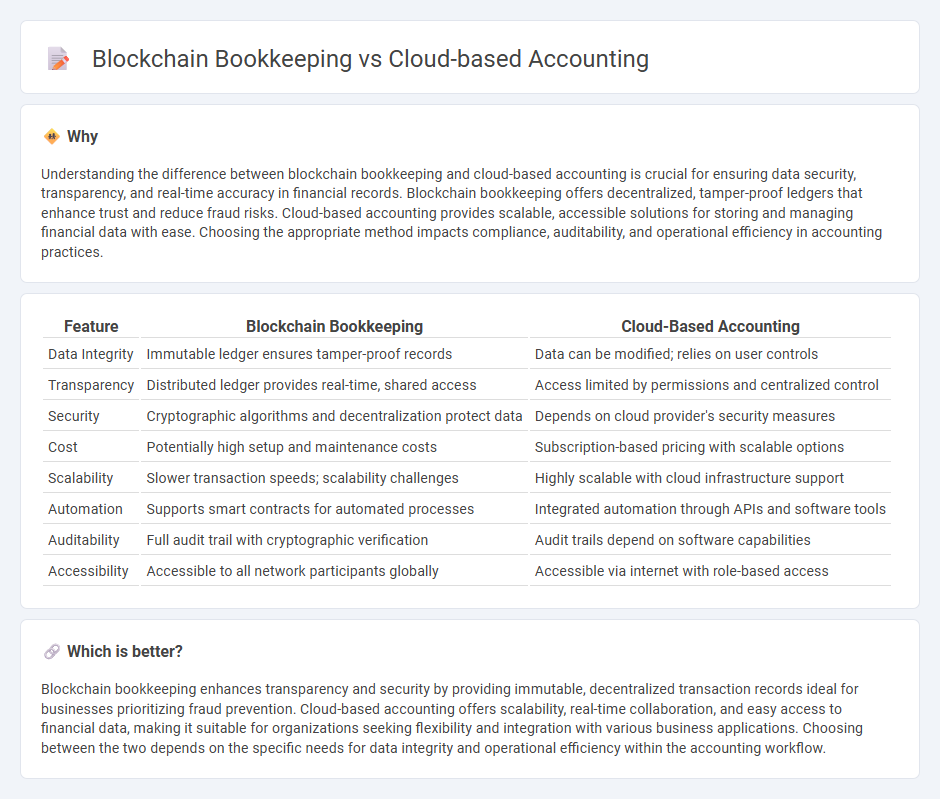
Blockchain bookkeeping offers decentralized, tamper-proof ledger capabilities that enhance transparency and security in financial record-keeping compared to traditional methods. Cloud-based accounting provides scalable, real-time access to financial data through internet-connected platforms, improving collaboration and efficiency for businesses. Explore how integrating these technologies can transform financial management for your organization.
Why it is important
Understanding the difference between blockchain bookkeeping and cloud-based accounting is crucial for ensuring data security, transparency, and real-time accuracy in financial records. Blockchain bookkeeping offers decentralized, tamper-proof ledgers that enhance trust and reduce fraud risks. Cloud-based accounting provides scalable, accessible solutions for storing and managing financial data with ease. Choosing the appropriate method impacts compliance, auditability, and operational efficiency in accounting practices.
Comparison Table
| Feature | Blockchain Bookkeeping | Cloud-Based Accounting |
|---|---|---|
| Data Integrity | Immutable ledger ensures tamper-proof records | Data can be modified; relies on user controls |
| Transparency | Distributed ledger provides real-time, shared access | Access limited by permissions and centralized control |
| Security | Cryptographic algorithms and decentralization protect data | Depends on cloud provider's security measures |
| Cost | Potentially high setup and maintenance costs | Subscription-based pricing with scalable options |
| Scalability | Slower transaction speeds; scalability challenges | Highly scalable with cloud infrastructure support |
| Automation | Supports smart contracts for automated processes | Integrated automation through APIs and software tools |
| Auditability | Full audit trail with cryptographic verification | Audit trails depend on software capabilities |
| Accessibility | Accessible to all network participants globally | Accessible via internet with role-based access |
Which is better?
Blockchain bookkeeping enhances transparency and security by providing immutable, decentralized transaction records ideal for businesses prioritizing fraud prevention. Cloud-based accounting offers scalability, real-time collaboration, and easy access to financial data, making it suitable for organizations seeking flexibility and integration with various business applications. Choosing between the two depends on the specific needs for data integrity and operational efficiency within the accounting workflow.
Connection
Blockchain bookkeeping enhances cloud-based accounting by providing decentralized, immutable ledgers that increase data security and transparency. Cloud-based accounting platforms leverage blockchain technology to ensure real-time synchronization and verification of financial transactions across multiple users. This integration reduces the risk of fraud, streamlines audit processes, and improves the accuracy of financial reporting.
Key Terms
Data Security
Cloud-based accounting offers centralized data storage with encryption protocols and multi-factor authentication to protect financial information, making it accessible yet secure. Blockchain bookkeeping utilizes decentralized ledgers and cryptographic hashing, ensuring immutable transaction records and reducing risks of data tampering or fraud. Explore the differences in data security features between cloud and blockchain accounting to make an informed decision for your business.
Real-time Access
Cloud-based accounting enables real-time financial data access through centralized servers, allowing businesses to update and retrieve information instantly from any location with internet connectivity. Blockchain bookkeeping offers real-time access with enhanced security and immutability by recording transactions on a decentralized ledger, ensuring transparency and tamper-proof records across all participants. Explore how these technologies transform financial management by improving accuracy, security, and accessibility.
Immutability
Cloud-based accounting offers scalability and real-time access but remains vulnerable to data alteration through authorized or unauthorized changes. Blockchain bookkeeping ensures immutability by recording transactions on a decentralized ledger, preventing modifications and enhancing trust and transparency in financial records. Explore the advantages of these technologies to determine the best fit for your accounting needs.
Source and External Links
Cloud Based Accounting: What is It and Why You Need It - Cloud-based accounting uses remote servers through a SaaS model, offering flexibility, real-time updates, scalability, and cost efficiency while enabling access from multiple locations and devices for collaboration and efficient financial operations.
Cloud Accounting: What It Is, How It Works And Its Benefits - Cloud accounting software operates on secure web-based platforms accessible remotely, streamlining business processes with collaborative features, data security, and no need for individual desktop installations, distinguishing it from traditional accounting software by enabling access from anywhere.
15 Benefits of Cloud Accounting - Cloud accounting automates many manual tasks, improves compliance and accuracy, supports environmental sustainability by reducing paper use, and increases efficiency with features like automatic transaction imports, tax calculations, and electronic invoicing.
 dowidth.com
dowidth.com